Whether in leaves, flowers, roots, or seeds, medicinal plants can gently and safely support the mother throughout her pregnancy. I’ll guide you to find the herbal tea that suits you best.
Contrary to popular belief, some herbal teas are permitted during pregnancy. They help manage minor issues such as nausea, acid reflux, constipation, fatigue, and stress.
It’s important to choose medicinal plants that are organic and French to ensure optimal quality and results. France is indeed a major producer of medicinal plants. Here is my selection of the 6 best herbal teas for pregnancy.
📚 Also read | Best dietary supplements for pregnancy: a pharmacist’s opinion
1. Ginger tea for nausea
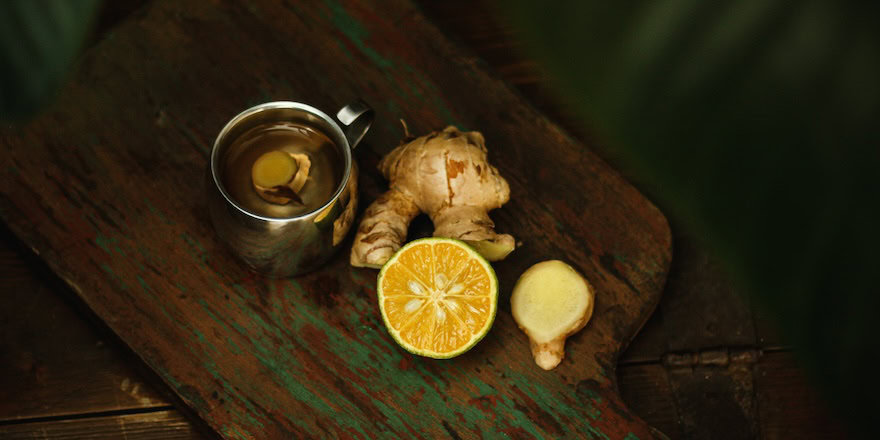
Il est très fréquent qu’au cours des premières semaines de grossesse (à partir de la 4e-6e SA) for pregnant women to experience nausea sensations, even vomiting. For some women, this nausea can be very uncomfortable.
The rhizomes of ginger (Zingiber officinale), with their anti-vomiting and anti-nauseatic properties, are recommended to soothe these issues, as numerous studies, particularly this one, indicate.
Specific use in pregnant women is accepted by WHO starting at 250 mg of dry ginger, in decoction, 4 times a day.
For practical reasons, I recommend preparing 1L in the morning and drinking it slowly throughout the day. For 1L, use 1g of dry rhizomes, letting them steep for at least 15-20 minutes in well-heated water.
Note, for fresh ginger, you need 10 g per 1L per day.
In addition to ginger, you can try other remedies to relieve symptoms. For instance, eat smaller meals, avoid overly fatty or sweet foods, and prefer semi-liquid foods (soup, mash, broth, yogurt…). These help with rapid digestive absorption.
2. Common mallow tea for acid reflux
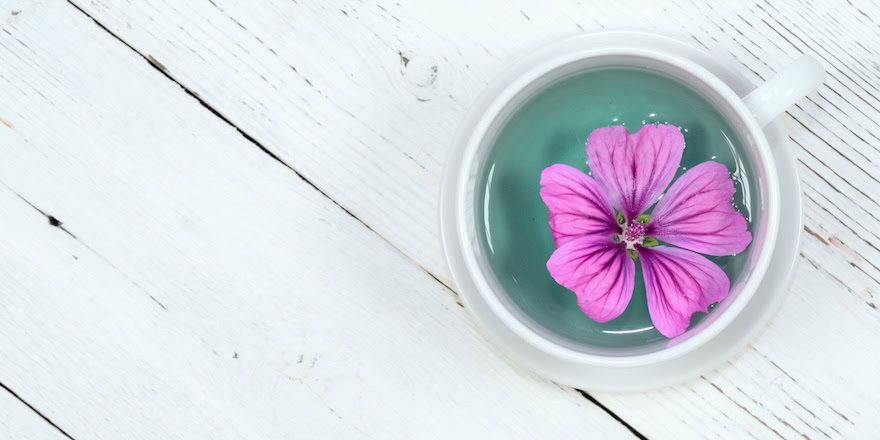
Often occurring late in pregnancy, heartburn related to gastroesophageal reflux can be very bothersome for the mother.
The flowers of common mallow (Malva sylvestris), with their soothing and anti-inflammatory properties, help line the stomach and esophagus walls. They thus lessen the burning sensations, as indicated by this study.
You can prepare 1L of tea in the morning and drink a cup after meals. I generally advise my clients to let 4 tablespoons of common mallow flowers steep in 1L of hot water for at least 15 minutes. The water turns a magnificent azure blue. You’ll see, it’s magical!
Besides the infusion, I encourage mothers to adopt some hygiene and dietary guidelines. Avoid spicy foods, fried items, coffee, tea, and carbonated drinks. Eating smaller meals and not lying down immediately after dinner can also help slow the onset of symptoms.
3. Psyllium tea for constipation
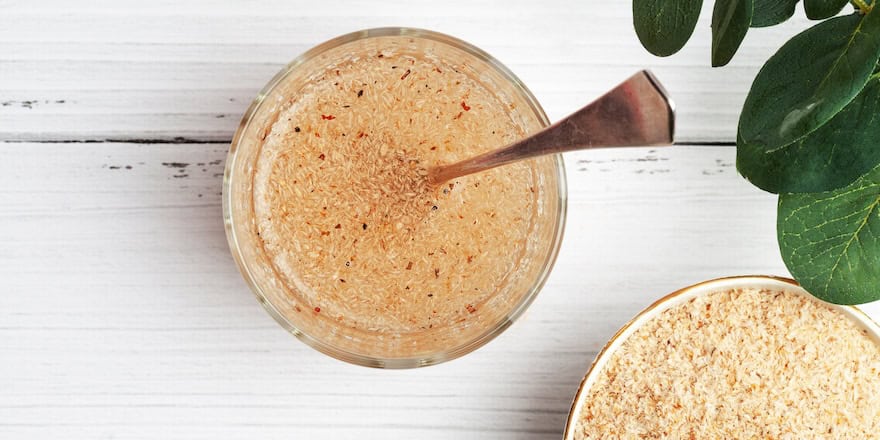
The seeds of blond psyllium or blond plantain (Plantago ovata) are traditionally used to manage constipation in pregnant women. Rich in mucilage, psyllium seeds help soften stools and promote the passage of the food bolus.
Mucilages are molecules that form a gel upon contact with water and mucous membranes. This gel coats the intestinal walls and facilitates food passage.
I recommend staying well-hydrated to assist psyllium’s action.
How to prepare the tea? By taking the equivalent of 25 to 30 g of psyllium seeds per day, divided into 2 to 3 servings after meals. For a cup of hot water, use 10 g of pre-ground seeds, let them rest for about twenty minutes, and slowly drink your tea.
📚 Also read | Our tips for choosing the right psyllium
4. Stinging nettle leaves in tea to reduce fatigue
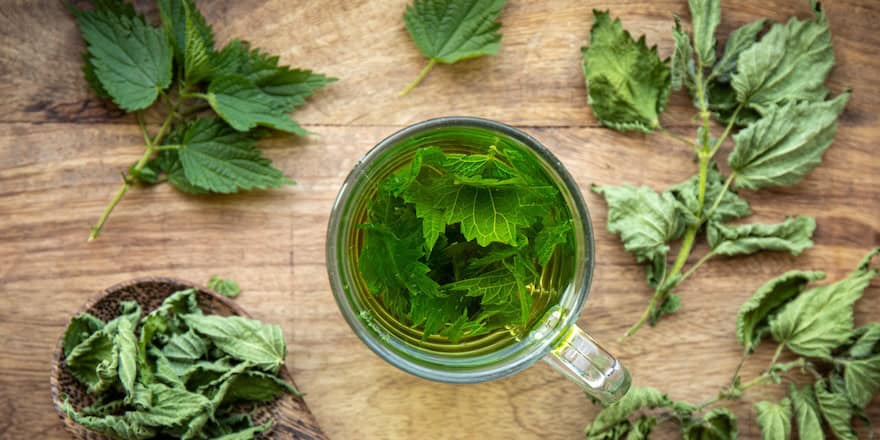
The stinging nettle (Urtica dioica), as its Latin name suggests, is known for being urticarial. That means it causes itching when touched. Yet it is one of the medicinal plants with the most virtues. It is, in fact, one of my favorite plants!
It contains almost all the essential amino acids. As well as large amounts of:
- vitamins C, A, E, B1, B2, B3, B6
- iron
- calcium
- phosphorus
- manganese
- magnesium
- potassium
- copper
This gives it many medicinal properties: re-mineralizing, anti-anemic, antioxidant, immune-boosting, anti-inflammatory…
Its wealth of trace elements makes it the go-to plant for managing fatigue in pregnant women. Plan for at least 3 cups of nettle leaves per day for 20 days.
Bonus: as shown in this study, in case of postpartum hemorrhage, it is recommended as a treatment for at least 1 month to counteract iron deficiency and fatigue.
5. Lemon balm infusion for stress relief
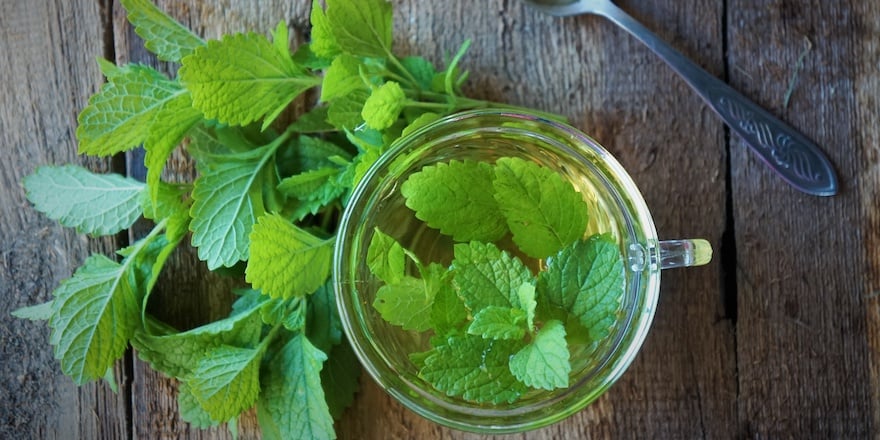
The subtly lemony taste of lemon balm (Melissa officinalis) makes it one of the most popular medicinal plants for tea.
Its leaves are traditionally used for the relief of mild stress symptoms and to promote sleep.
It is recommended throughout the day and at bedtime. Its action is quite mild and does not cause drowsiness or pose a risk to the fetus, as this study indicates.
The calculation is 1 tablespoon of leaves for 1 cup of 33 cL of hot water. Be careful not to use boiling water and make sure to cover the infusion well! Because lemon balm leaves are sensitive to heat.
6. Raspberry leaf tea to support childbirth
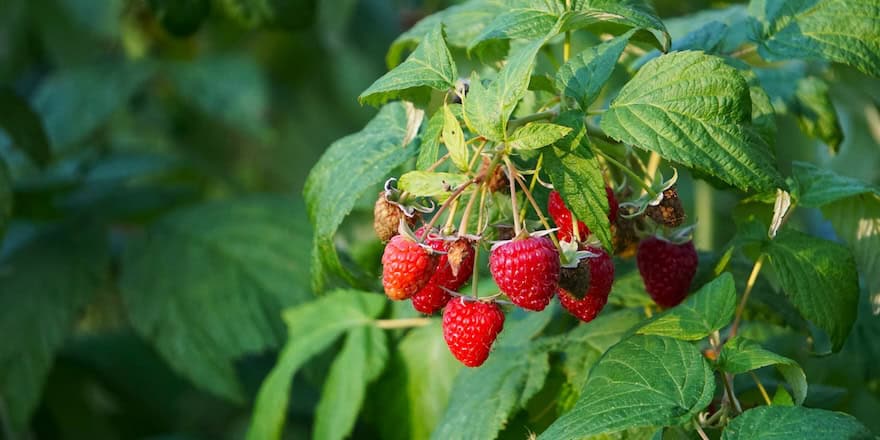
If there is one medicinal plant entirely dedicated to women, it is the raspberry plant. From the first menstrual cycle to menopause, raspberry leaves are used for their antispasmodic properties in case of period pain.
Especially towards the end of pregnancy, starting from the 36th week of amenorrhea, to facilitate labor and avoid the use of forceps as shown in this study.
For optimal effectiveness, I recommend drinking between 1L and 1.5L of raspberry leaf tea per day. It generally requires 4 tablespoons of leaves for 1L of tea.
Sources and scientific studies
Anadol, E., Demirel, M., Süntar, İ., Gültekin, S., et al. Investigation of the Effect of Melissa officinalis L. on Fetal Development by Ultrasonography in Rats. Journal of Gazi University Health Sciences Institute, 2023
European Union herbal monograph on Malva sylvestris L., flos EMA/HMPC/749511/2016
Community herbal monograph on Melissa officinalis L., folium EMA/HMPC/196745/2012
Community herbal monograph on Plantago ovata Forssk., seminis tegumentum EMA/HMPC/199774/2012
Gasparetto JC, Martins CA, Hayashi SS, Otuky MF, Pontarolo R. Ethnobotanical and scientific aspects of Malva sylvestris L.: a millennial herbal medicine. J Pharm Pharmacol. 2012
Heitmann K, Nordeng H, Holst L. Safety of ginger use in pregnancy: results from a large population-based cohort study. Eur J Clin Pharmacol. 2013
Mashhad, Iranian Journal of Obstetrics, Gynecology and Infertility, Mashhad University of Medical Sciences, The effect of Urtica dioica drop on postpartum hemorrhage: a triple-blind randomized clinical trial., 2022
Paul ZA, Malla AT, Dar MA, Masoodi MH. Phytochemistry and Pharmacological Activity of Malva sylvestris L: A Detailed Insight. Comb Chem High Throughput Screen. 2024
WHO recommendations on antenatal care for a positive pregnancy experience. Geneva: World Health Organization, 2017.



